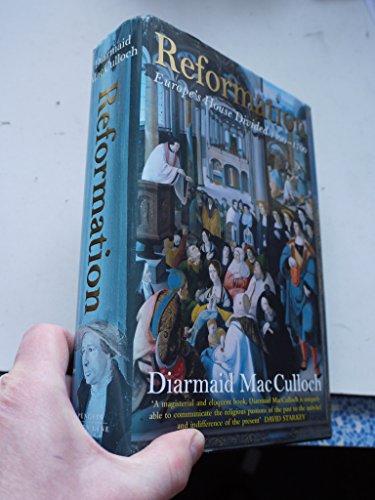Reformation: Europe's House Divided 1490 - 1700
MacCulloch, Diarmaid
About the Book
Description:
Buy with confidence! Book is in acceptable condition with wear to the pages, binding, and some marks within 3.17. Seller Inventory # bk0713993707xvz189zvxacp
About this title:
Synopsis: The Reformation, which began in 1519 when Martin Luther famously nailed his 95 theses to the door of Wittenberg Cathedral, is the seismic event in European history over the past thousand years. The medieval world was torn apart, and not just European religion, but thought, culture, society, state systems, personal relations - everything - was turned upside-down. Just about everything which followed in European history - and because of the Pilgrim Fathers, in America too - can be traced back in one way or another to the Reformation and the Counter-Reformation which it provoked. This is where the modern world painfully and dramatically began. These key events in European history are examined in this volume.
Review: Diarmaid MacCulloch wrote what is widely considered to be the authoritative account of the Reformation—a critical juncture in the history of Christianity. "It is impossible to understand modern Europe without understanding these sixteenth-century upheavals in Latin Christianity," he writes. "They represented the greatest fault line to appear in Christian culture since the Latin and Greek halves of the Roman Empire went their separate ways a thousand years before; they produced a house divided." The resulting split between the Catholics and Protestants still divides Christians throughout the Western world. It affects interpretations of the Bible, beliefs about baptisms, and event how much authority is given to religious leaders. The division even fuels an ongoing war. What makes MacCulloch's account rise above previous attempts to interpret the Reformation is the breadth of his research. Rather than limit his narrative to the actions of key theologians and leaders of the era—Luther, Zingli, Calvin, Loyola, Cranmer, Henry VIII and numerous popes—MacCulloch sweeps his narrative across the culture, politics and lay people of Renaissance Western Europe. This broad brush approach touches upon many fascinating discussions surrounding the Reformation, including his belief that the Latin Church was probably not as "corrupt and ineffective" as Protestants tend to portray it. In fact, he asserts that it "generally satisfied the spiritual needs of the late medieval people." As a historical document, this 750-page narrative has all the key ingredients. MacCulloch, a professor of history as the Church of Oxford University, is an articulate and vibrant writer with a strong guiding intelligence. The structure is sensible—starting with the main characters who influenced reforms, then spreading out to the regional concerns, and social intellectual themes of the era. He even fast forwards into American Christianity—showing how this historical era influences modern times. MacCulloch is a topnotch historian—uncovering material and theories that will seem fresh and inspired to Reformation scholars as well as lay readers. --Gail Hudson
Bibliographic Details
Title: Reformation: Europe's House Divided 1490 - ...
Publisher: Allen Lane
Publication Date: 2003
Binding: Hardcover
Condition: Fair
